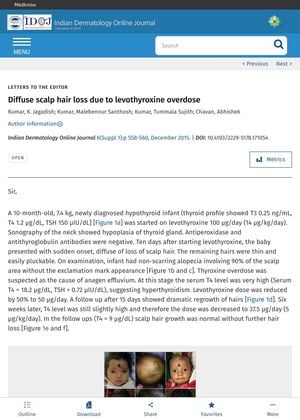TLDR Too much levothyroxine can cause hair loss in infants.
In 2015, a case study was conducted on a 10-month-old infant diagnosed with hypothyroidism who experienced diffuse scalp hair loss due to an overdose of levothyroxine. The infant was initially given a dose of 100 μg/day of levothyroxine, which led to a sudden onset of hair loss involving 90% of the scalp area. The high serum T4 level (18.2 μg/dL) suggested hyperthyroidism, leading to the conclusion that the hair loss was due to thyroxine overdose. The levothyroxine dose was then reduced by 50% to 50 μg/day, and a follow-up after 15 days showed significant hair regrowth. Six weeks later, the T4 level was still slightly high, so the dose was further decreased to 37.5 μg/day. Subsequent follow-ups showed normal scalp hair growth without further hair loss. The study concluded that hair follicles need adequate and correct levels of thyroxine for appropriate hair growth, and children on levothyroxine should be monitored for serum levels of T3 and T4.
 67 citations
,
January 2013 in “Indian Journal of Dermatology, Venereology and Leprology”
67 citations
,
January 2013 in “Indian Journal of Dermatology, Venereology and Leprology” The document concludes that alopecia areata is an autoimmune disease without a definitive cure, but treatments like corticosteroids are commonly used.
 61 citations
,
January 2013 in “Indian Journal of Dermatology, Venereology and Leprology”
61 citations
,
January 2013 in “Indian Journal of Dermatology, Venereology and Leprology” Hair usually grows back 1-3 months after treatment for anagen effluvium, and children with Loose Anagen Hair Syndrome often improve by adolescence.
 49 citations
,
December 2009 in “Journal of Investigative Dermatology”
49 citations
,
December 2009 in “Journal of Investigative Dermatology” Thyroid function affects skin health, with a complex interaction between the two.
 115 citations
,
August 2008 in “The Journal of Clinical Endocrinology & Metabolism”
115 citations
,
August 2008 in “The Journal of Clinical Endocrinology & Metabolism” Thyroid hormones help hair grow, reduce hair loss, and increase hair pigment.
 February 2024 in “Biomedicines”
February 2024 in “Biomedicines” Hormones like androgens, estrogen, thyroid hormones, and stress hormones can contribute to hair loss, and treatments target these hormonal imbalances.
 December 2025 in “International Journal of Research in Dermatology”
December 2025 in “International Journal of Research in Dermatology” A multidisciplinary approach is crucial for effectively managing hair loss linked to endocrine and gynecological disorders.
 May 2023 in “Frontiers in Endocrinology”
May 2023 in “Frontiers in Endocrinology” Thyroid disease can cause skin, hair, and nail problems, and treating the thyroid condition often improves these symptoms.
 9 citations
,
July 2020 in “Experimental Dermatology”
9 citations
,
July 2020 in “Experimental Dermatology” Topical L-thyroxine may help with wound healing and hair growth but should be used short-term due to potential risks.
 2 citations
,
January 2023 in “Journal of Clinical Medicine”
2 citations
,
January 2023 in “Journal of Clinical Medicine” People with hair loss conditions may also have thyroid disorders, but more research is needed to understand the connection.









